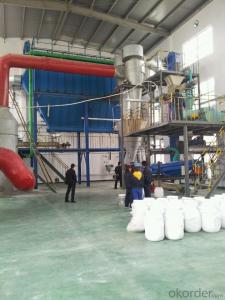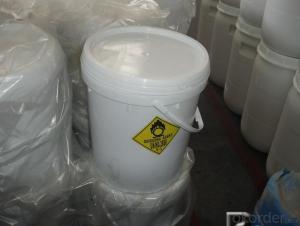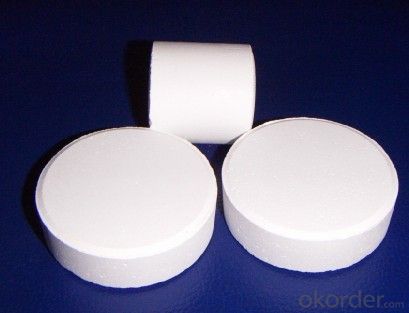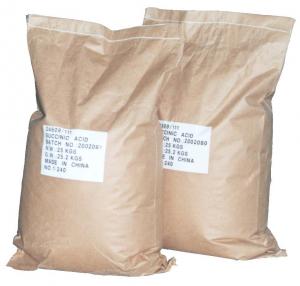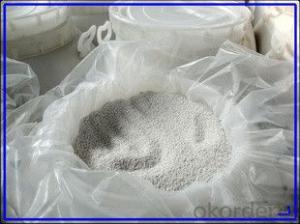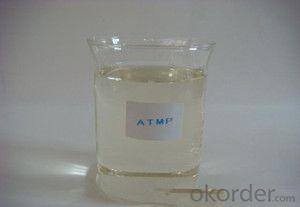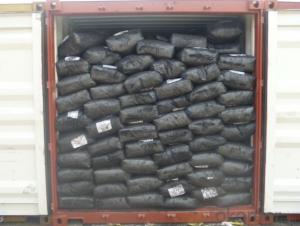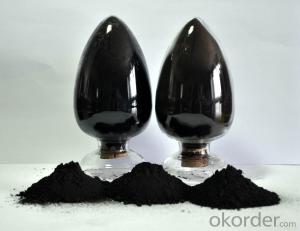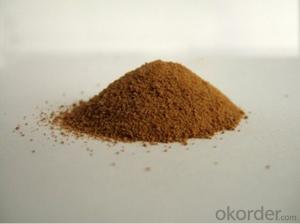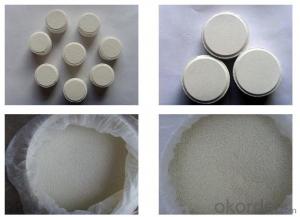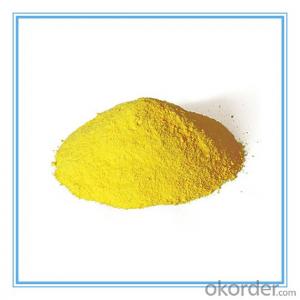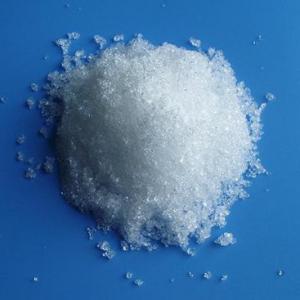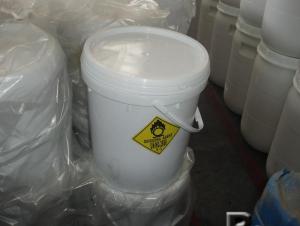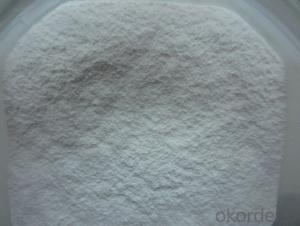Low Price Swimming Pool Treatment Powder Cyanuric Acid
- Loading Port:
- Tianjin
- Payment Terms:
- TT OR LC
- Min Order Qty:
- 17 m.t.
- Supply Capability:
- 1800 m.t./month
OKorder Service Pledge
OKorder Financial Service
You Might Also Like
Cyanuric Acid
Structure of Cyanuric Acid General Descriptions:
Trade Name: Isocyanuric Acid
Other name: Cyanuric Acid; 1,3,5-Triazine-2,4,6-triol
Uses: Bleaches and sanitisers.
Formula: C3H3N3O3
Molecular Weight: 129.07
CAS NO.: 108-80-7
Main Features of the Cyanuric Acid:
White powder, granular or colored tablet form, non-toxic and odorless
Cyanuric Acid Image:

Cyanuric Acid Specification:
| ITEM | SPECIFICATION | RESULT | |||
| Content | ≥98.5% | 98.64% | |||
| Moisture | ≤0.5% | 0.11% | |||
| PH value | 4.0-4.5 | 4.26 | |||
| Fe2+ | ≤15ppm | 7.5ppm | |||
| NH4+ | ≤200ppm | 97ppm | |||
| Ash | ≤0.1% | 0.05% | |||
| Insoluble matter in DMF | ≤0.3% | 0.25% | |||
| Appearance | White crystalline power | White crystalline power | |||
| Mesh number | 95% pass 80 mesh | 95% pass 80 mesh | |||
| White degree | ≥89 | 90.5 | |||
| Conclusion: | The product complies with the standard above. | ||||
Cyanuric Acid Packing:
in 25kg, 1000kg bag for powder
in 25kg plastic bag or 50kg PE drums for granular
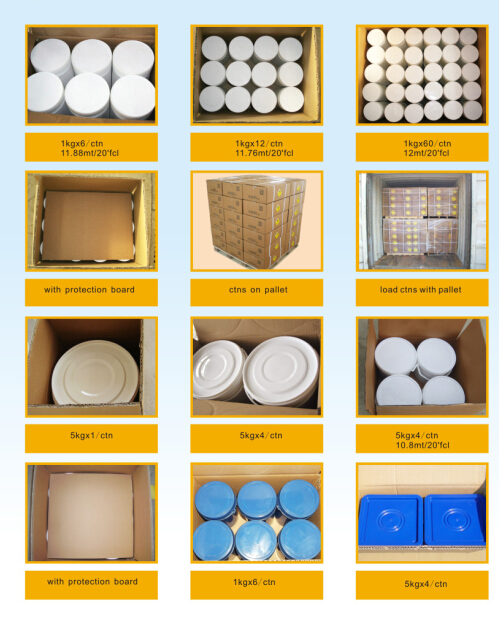
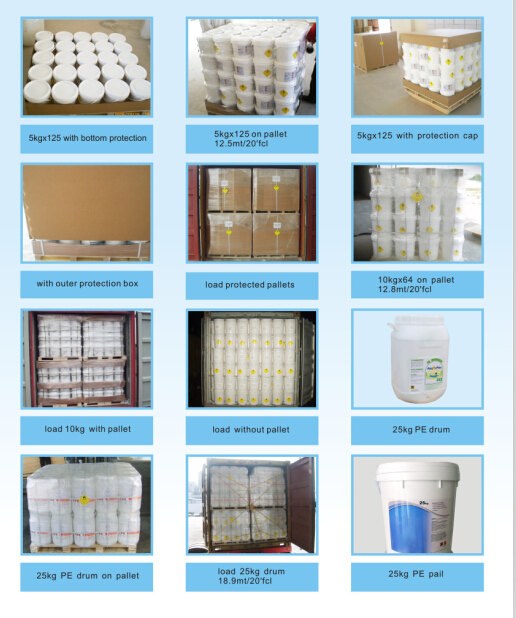
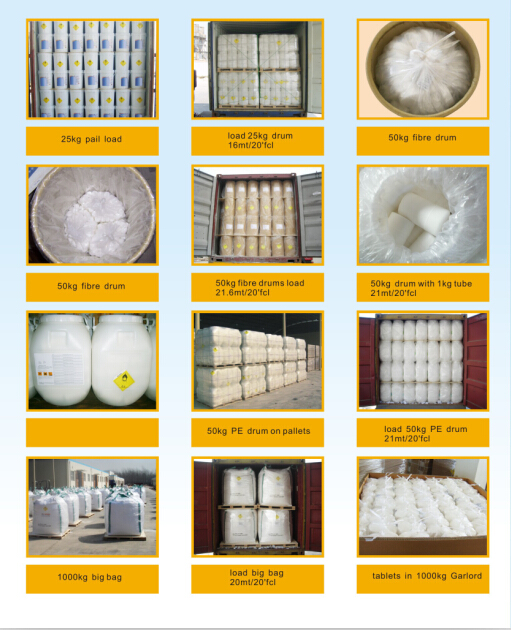
Storage:
kept in a light-proof,well-colsed,dry and cool place.
Service we can provide:
1. Mixed container, we can mix different items in one container.
2. Quality control, before shipment, free sample for test. after shipment, keep sample for 3 years
3. Prompt shipment with professional documents
4. Packing as your request, with photo before shipment
Our Advantages:
Full experience of large numbers containers loading in Chinese sea port
Fast shipment by reputed shipping line
Packing with pallet as buyer's special request
Best service after shipment with e mail
Cargoes together with container sales seervice available
Full experience for Canada & Japan export
Cargoes photo before and after loading into container
Raw materials from chinese origin
Professional Loading:
1.We will provide you with professional loading
2.We have one team supervise uploading the materials. We will check the container, the packages
3.Every step, taking pictures and make records.
4.we will make a complete Loading Report for our customer of each shipment
- Q: High chemistry: Does the catalyst affect the heat and heat of the reaction?
- The catalyst that has no effect affects only the rate of reaction
- Q: Will the catalyst change the reaction rate in the chemical reaction?
- Many of the catalysts are specific in varying degrees, and when added to the chemical reaction system that it can catalyze, it must change the rate of chemical reaction, and of course both positively and negatively catalyzed. Chemical reaction rate, it can not be called a catalyst.
- Q: Can some chemical reactions have a variety of catalysts that are correct or wrong?
- Very correct, many reactions can have a lot of catalyst. Such as hydrogen peroxide decomposition can be used manganese dioxide or fe destroy
- Q: How does the catalyst affect chemical balance? Why the catalyst has no effect on the chemical equilibrium, for v-t diagram
- Negative catalyst increases the activation energy, so that the reaction time becomes longer
- Q: pls give one or two catalysts that are used in the industry for example:Rhodium catalyst in a catalytic converter of a car or the Iron catalyst for making ammoniaTHANKS :)
- i will tell you the hydrogen and carbonmonixide production in indsutry they will use alumina based nickel catalyst for adsorption of gases, at high temperature it will breaks as small molecules like hydrogen, co2, co,ch4, after they will separate them using carbon molecular seives as catalyst. another catalyst for hydrogenation of double bond is copper chromate for sulphur removal from disel and petrol they will use COMOX ( copper and molybdinum catalyst ) after then pass through zinc sulfide with hydrogen gas , the sulfur will removed as a hydrogen sulfide.
- Q: What are the requirements for the catalyst for the chemical industry?
- Generally find a few, according to the cost and cost of cost, choose cost-effective
- Q: I opened catalyst control center to see what its was, i didn't change anything and now when i full screen a youtube and hulu the screen will be black and the loading bar at the bottom will be stuck. I also noticed that now when i play minecraft all the blocks have a black out line i cant get rid of. I tried deleting my .minecraft and that didn't fix it.
- Catalyst control center? You, my friend, have a Radeon graphics card. What's happening is that somewhere you have Anti-Aliasing turned on. Go back into your catalyst control center and anywhere where there is an option to 'use application settings'- select it. It's supposed to improve your graphics quality, but there are a lot of bugs with it on a whole bunch of applications and games- including Minecraft. Oh, and as for the youtube thing- alt+tab should show you where your video has disappeared to. Yes, I know- it's bloody weird, but flash is buggy as heck, and Radeon graphics cards are weird; I should know- I have one too! That should do the trick! If it doesn't work then there's likely an extra option somewhere that you haven't ticked to 'use application settings'.
- Q: To write a 1500 words of small papers, so please help you busy
- Change the course of the reaction
- Q: Is there a catalyst for a chemical reaction?
- There may be many, but some of the catalytic effect of the catalyst is good, and perhaps some of the catalyst has not been found
- Q: Does the nature and quality of the catalyst itself change before and after the chemical reaction?
- The catalyst is not consumed in the chemical reaction. They are able to be separated from the reactants, either before or after the reaction. However, they may be consumed at a certain stage of the reaction and then regenerated before the end of the reaction.
Send your message to us
Low Price Swimming Pool Treatment Powder Cyanuric Acid
- Loading Port:
- Tianjin
- Payment Terms:
- TT OR LC
- Min Order Qty:
- 17 m.t.
- Supply Capability:
- 1800 m.t./month
OKorder Service Pledge
OKorder Financial Service
Similar products
Hot products
Hot Searches
Related keywords


